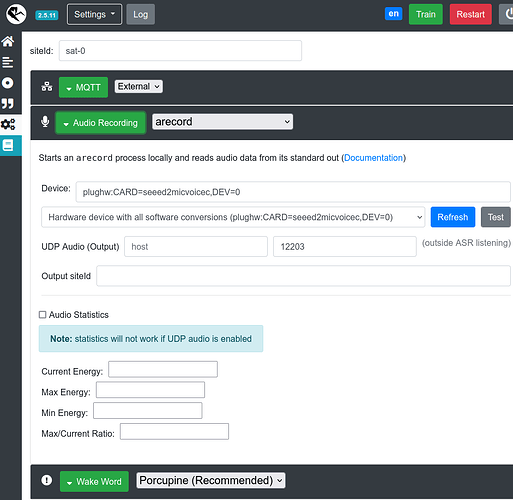Hello! I’m going to try to be as complete as possible with this post so apologies if it is long (I want to make sure you helpers out there know what I’ve tried).
The short version is: arecord works when I use it on the CLI (simple wav recording, same options as Rhasspy says it uses), but when I trigger a manual wake up in the Rhasspy web UI, nothing is detected (and not recorded?) usually with a TimeoutError. However, enabling Raven for a custom wake word I can record the word and play it back!
I’m stuck as to why nothing is recorded / detected in terms of commands when I directly wake up Rhasspy from the web UI.
Setup:
- RasPi Zero WH with PiOS (full) running in CLI mode (no GUI), most recent updates applied
- Python 3.7 (all libraries up to date)
- Adafruit Voice Bonnet and seeed voicecard installed
- Rhasspy 2.5.11 installed as Debian package (armel) with no errors
- You can see my current config on GitHub
My steps:
- Start the pi, run
arecord -r 16000 -f S16_LE -c 1 test.wavto test audio capture (andaplayto confirm it recorded) - Run rhasspy (
rhasspy -profile en 2>&1 rhasspy.log) - Wait a long time for everything to start up (usually ~6 minutes)
- Go to the “Audio Recording” section to see / tweak the device as necessary
- Go to Rhasspy UI main page, click “Wake Up”, wait for beep, try saying “What time is it” (which is in my sentences)
- Watch the logs and see nothing detected, usually with a TimeoutError (see here for logs)
Things I’ve tried:
- Searching this forum extensively (nothing has helped yet)
- Turning it off and on again (rhasspy, the Pi, my brain)
- Changing the audio devices in the “Audio Recording” section (any that say “working”, and also “hw:1” manually entered since that has worked from the CLI)
- Switching to PyAudio (does not work, but maybe for different reasons?)
- Switching to a manual entered command (no change)
- Hitting the “Train” button (and letting that finish) then trying again (no change)
- Using Raven to record a wake word to see that Rhasspy can in fact use arecord (this does work, I can record the word and play it back).
Log Files
I’ve added some log files to a git repo in case that helps anyone to help me. ![]()
